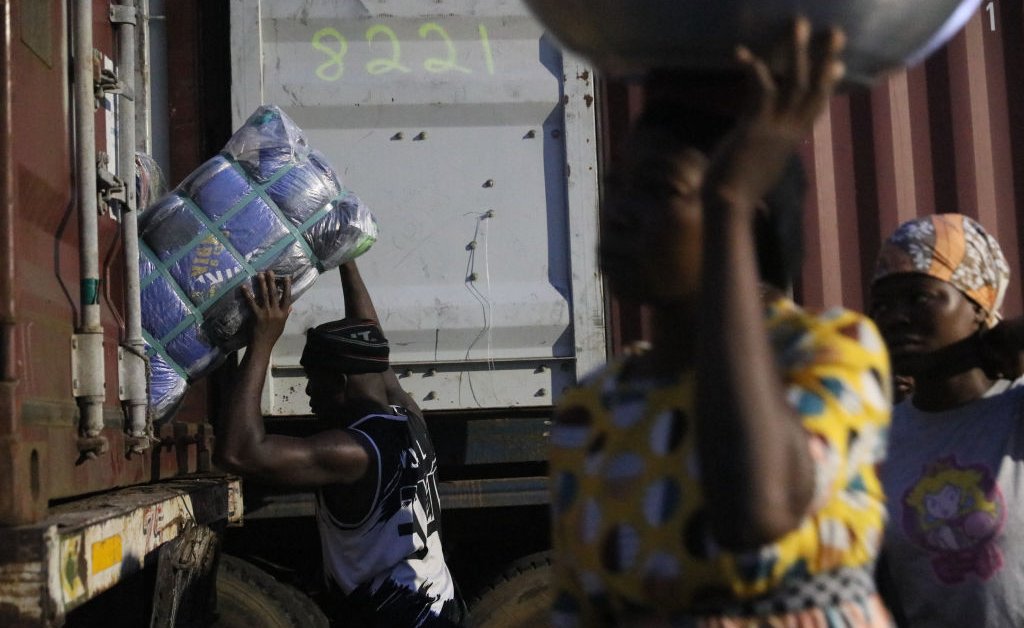Upcycling Challenge: Rethinking Fast Fashion's Impact On Africa

Welcome to your ultimate source for breaking news, trending updates, and in-depth stories from around the world. Whether it's politics, technology, entertainment, sports, or lifestyle, we bring you real-time updates that keep you informed and ahead of the curve.
Our team works tirelessly to ensure you never miss a moment. From the latest developments in global events to the most talked-about topics on social media, our news platform is designed to deliver accurate and timely information, all in one place.
Stay in the know and join thousands of readers who trust us for reliable, up-to-date content. Explore our expertly curated articles and dive deeper into the stories that matter to you. Visit Best Website now and be part of the conversation. Don't miss out on the headlines that shape our world!
Table of Contents
Upcycling Challenge: Rethinking Fast Fashion's Impact on Africa
Fast fashion's devastating impact on Africa is undeniable. Mountains of discarded clothing flood the continent, overwhelming landfills and harming the environment. But a growing movement is challenging this tide, transforming waste into opportunity through innovative upcycling initiatives. This article explores the challenges and triumphs of this vital movement, highlighting the innovative solutions being implemented across Africa to combat the negative effects of fast fashion.
The Dark Side of Cheap Clothes:
The allure of cheap, trendy clothing from fast-fashion giants has significantly impacted African economies and environments. Millions of tons of used clothing, much of it unsuitable for donation, are imported annually, often undercutting local textile industries and creating a massive waste problem. This influx of unwanted garments:
- Damages local textile industries: Local artisans and businesses struggle to compete with the incredibly low prices of imported second-hand clothing.
- Pollutes the environment: Unsustainable disposal methods lead to overflowing landfills, soil contamination, and water pollution. The decomposition of synthetic fabrics releases harmful microplastics into the ecosystem.
- Undermines sustainable practices: The reliance on imported, often low-quality clothing discourages the development and adoption of sustainable textile production methods within Africa.
Upcycling: A Sustainable Solution:
Fortunately, a wave of creativity and entrepreneurship is tackling this challenge head-on. Upcycling, the process of transforming discarded materials into something new and valuable, is gaining traction across Africa. Innovative initiatives are turning textile waste into:
- New clothing and accessories: Designers and entrepreneurs are repurposing old clothes into unique, stylish garments and accessories, creating a thriving market for upcycled fashion. This not only reduces waste but also fosters creativity and generates income.
- Home décor and crafts: Old fabrics are being transformed into beautiful home décor items, rugs, and other handcrafted goods, adding value to discarded materials and promoting local craftsmanship.
- Industrial materials: Some initiatives are exploring the use of textile waste in the creation of composite materials for construction and other industrial applications.
Challenges Remain:
Despite the progress, significant challenges persist:
- Scaling up operations: Many upcycling initiatives are small-scale and struggle to expand their operations due to limited funding and infrastructure.
- Lack of awareness: Raising public awareness about the negative impacts of fast fashion and the benefits of upcycling is crucial for driving consumer demand.
- Access to technology and resources: Access to advanced recycling technologies and specialized equipment can be limited, hindering the efficiency and scalability of upcycling projects.
The Future of Sustainable Fashion in Africa:
The upcycling challenge presents both a significant problem and a tremendous opportunity. By investing in innovative solutions, supporting local entrepreneurs, and raising public awareness, Africa can transform its textile waste problem into a catalyst for sustainable economic growth and environmental protection. The future of sustainable fashion in Africa hinges on collaborative efforts between governments, businesses, and individuals to promote upcycling and reduce reliance on fast fashion. This requires a collective commitment to a circular economy model, where waste is minimized and resources are maximized. Learn more about supporting sustainable fashion initiatives in Africa by exploring organizations like [link to relevant NGO or organization]. Let's work together to build a more sustainable and equitable future for the African textile industry.

Thank you for visiting our website, your trusted source for the latest updates and in-depth coverage on Upcycling Challenge: Rethinking Fast Fashion's Impact On Africa. We're committed to keeping you informed with timely and accurate information to meet your curiosity and needs.
If you have any questions, suggestions, or feedback, we'd love to hear from you. Your insights are valuable to us and help us improve to serve you better. Feel free to reach out through our contact page.
Don't forget to bookmark our website and check back regularly for the latest headlines and trending topics. See you next time, and thank you for being part of our growing community!
Featured Posts
-
 Le Liberty S Impose Grace A La Performance Exceptionnelle De Sabrina Ionescu 36 Points 11 Rebonds
Aug 08, 2025
Le Liberty S Impose Grace A La Performance Exceptionnelle De Sabrina Ionescu 36 Points 11 Rebonds
Aug 08, 2025 -
 36 Points Et 11 Rebonds Sabrina Ionescu Bat Un Record Avec Le New York Liberty
Aug 08, 2025
36 Points Et 11 Rebonds Sabrina Ionescu Bat Un Record Avec Le New York Liberty
Aug 08, 2025 -
 Selena Gomez And Benny Blanco A Relationship Confirmed Inside Their Bond
Aug 08, 2025
Selena Gomez And Benny Blanco A Relationship Confirmed Inside Their Bond
Aug 08, 2025 -
 Ted Lasso Season 4 Jason Sudeikiss Record Breaking Salary Revealed
Aug 08, 2025
Ted Lasso Season 4 Jason Sudeikiss Record Breaking Salary Revealed
Aug 08, 2025 -
 The Music Notes Behind The Hits Jonas Brothers Maroon 5 And Beyond
Aug 08, 2025
The Music Notes Behind The Hits Jonas Brothers Maroon 5 And Beyond
Aug 08, 2025
Latest Posts
-
 Beyond The Wings Why The Loss Of Hooters Resonates
Aug 08, 2025
Beyond The Wings Why The Loss Of Hooters Resonates
Aug 08, 2025 -
 Arkansas Nurse Practitioner Emphasizes Timely Vaccination For Public Health
Aug 08, 2025
Arkansas Nurse Practitioner Emphasizes Timely Vaccination For Public Health
Aug 08, 2025 -
 Wnba 2024 Un Calendrier Charge De Matchs Et De Suspense
Aug 08, 2025
Wnba 2024 Un Calendrier Charge De Matchs Et De Suspense
Aug 08, 2025 -
 Arkansas Np Highlights Importance Of Staying Up To Date On Vaccinations
Aug 08, 2025
Arkansas Np Highlights Importance Of Staying Up To Date On Vaccinations
Aug 08, 2025 -
 Concerns Rise As Federal Government Cuts Funding For Crucial M Rna Research
Aug 08, 2025
Concerns Rise As Federal Government Cuts Funding For Crucial M Rna Research
Aug 08, 2025
